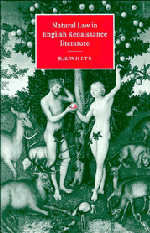Book contents
- Frontmatter
- Contents
- Preface
- Acknowledgments
- 1 Natural Law in history and Renaissance literature
- 2 The heritage of classical Natural Law
- 3 The reception of Natural Law in Renaissance England
- 4 Law and literature in sixteenth-century England
- 5 More's Utopia
- 6 ‘Love is the fulfilling of the law’: Arcadia and Love's Labour's Lost
- 7 ‘Hot temper leaps o'er a cold decree’: The Merchant of Venice and Measure for Measure
- 8 Shakespeare's The History of King Lear
- 9 Milton and Natural Law
- Epilogue: Hobbes and the Demise of classical Natural Law
- Appendix: Aquinas on the right to own private property
- Notes
- Select bibliography
- Index
4 - Law and literature in sixteenth-century England
Published online by Cambridge University Press: 17 September 2009
- Frontmatter
- Contents
- Preface
- Acknowledgments
- 1 Natural Law in history and Renaissance literature
- 2 The heritage of classical Natural Law
- 3 The reception of Natural Law in Renaissance England
- 4 Law and literature in sixteenth-century England
- 5 More's Utopia
- 6 ‘Love is the fulfilling of the law’: Arcadia and Love's Labour's Lost
- 7 ‘Hot temper leaps o'er a cold decree’: The Merchant of Venice and Measure for Measure
- 8 Shakespeare's The History of King Lear
- 9 Milton and Natural Law
- Epilogue: Hobbes and the Demise of classical Natural Law
- Appendix: Aquinas on the right to own private property
- Notes
- Select bibliography
- Index
Summary
Poets were not reticent about claiming for themselves, in George Puttenham's words, the roles of ‘the first priests, the first prophets, the first legislators and politicians in the world’.
And for that they were aged and grave men, and of much wisdom and experience in th'affairs of the world, they were the first lawmakers to the people, and the first politicians, devising all expedient means for the establishment of Common wealth, to hold and contain the people in order and duty by force and virtue of good and wholesome laws, made for the persuasion of the public peace and tranquillity.
Puttenham was no stranger to the law, a fact which might give added emphasis to his point. He was related to distinguished lawyers, and was a lawyer himself, having attended the Middle Temple in the late 1550s. His own career as lawyer and apologist for poetry epitomises the closeness of these pursuits in the Renaissance. Not only did he rub shoulders at the Inns of Court with poets and poets-to-be, not only did he share the common aim of rhetoric employed in a forensic oratory and poetry (‘persuasion of the public peace and tranquillity’), not only would he have understood the nature of legal fictions and poetic fictions, but he also sees the deeper theoretical issues, later plumbed by Sidney, implicit in his statement that poets ‘were the first lawmakers to the people’.
- Type
- Chapter
- Information
- Natural Law in English Renaissance Literature , pp. 72 - 106Publisher: Cambridge University PressPrint publication year: 1996

